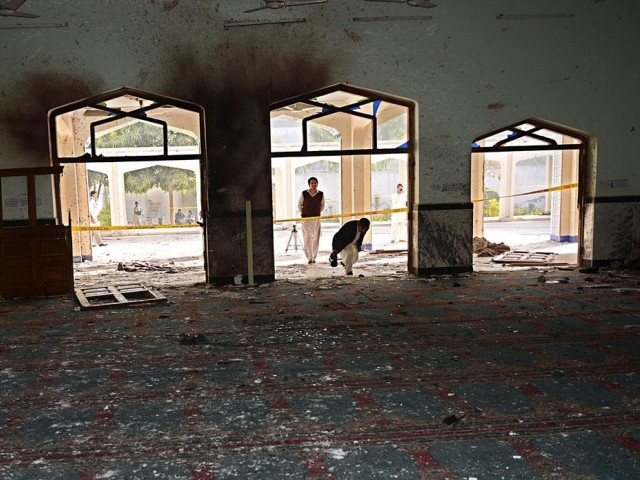Shell shock: Survivors piece together events of Imamia seige
At least 22 people died in a gun and suicide attack on the mosque.

Ali was prostrating during the Friday prayers when he and his fellow worshippers heard a bang, followed by debris and the sound of bits of the building falling apart and glass shattering. PHOTO: AFP
A medical student in the city, his friend Raza was from Badin, Sindh. His body was sent to his family through a private airline.
Ali wanted to find Raza’s glasses which fell in the mosque during the bloodbath. “I am not going to keep them. I came here to collect his belongings and send them to his family so they can keep his last memory,” said Ali, gingerly tucking the glasses into his pocket.
As he walked around the site, the crunch of broken glass and debris punctuated his steps, his gaze glued to the spot where his friend was shot dead.
Those long minutes
“They (the militants) came without any resistance,” recalled Ali. “I saw people lying on the floor like sacks of potatoes; they (the militants) were indiscriminately firing at helpless people.”
Ali was prostrating during the Friday prayers when he and his fellow worshippers heard a bang, followed by debris and the sound of bits of the building falling apart and glass shattering.
Rapid firing broke out and someone cried, “fall to the floor”, Ali remembered. “The firing and small blasts continued for 15 minutes,” he said.
“I waited for a bullet to pierce my head. I thought, like with the Army Public School, they would kill us one by one,” added Ali. “So I prayed for my life and hid with other worshippers hiding in the right corner of the mosque.” He said they were lucky as the attacker blew up before he could kill more.
“The room got dark and as soon as I could, I fled though the first door on the left,” recollected the medical student. “My foot was bleeding but I did not know the nature of the wound. A cab driver saw the blood and took me to Hayatabad Medical Complex.”
Trying to save lives
Basit was also in the thick of it during Friday’s attack. The fifty-year-old was back at the crime scene, keenly checking out the wreckage. Basit wanted to meet the prayer leader to offer his condolences; the imam’s son had died in the siege.
“I was in the fourth row; I saw the attackers dressed in a black uniform like the elite police force. They were two teenagers, firing with Kalashnikovs,” he said.
As soon as Basit found an opportune moment, he quickly dialled home to let his wife and children know he was alive. “They knew where I was and that I would be stuck in the siege, so I called them and told them I was alive, but was not sure if I would escape with my life.” Basit added, “They thought I was injured as I was panting when I spoke to him, but it was because of the smoke and the dust settling after the blast.”
The hall went dark during the attack, “I was confused as I could not tell who was injured and who was dead.” Basit crawled down the corridor and in a bid to save lives, took a Kalashinkov from one of the dead suicide bombers to fight back. “The magazine was still filled with rounds and I held on to the gun for 10 minutes to provide cover to the injured who were being rescued. In the end the attackers were killed.”
Of negligence
For Ghulam Hassan, another survivor, the aftermath of being in the attack was anger and blame. He was angry at the security guard who had been deployed on the mosque’s roof but had fled when he saw the attackers.
“The attackers came from the under-construction building on the right side of the mosque and the guard fled when he saw them,” said Hassan. “They easily removed the barbed wire and entered the mosque, all the while firing at one and all,” Hassan told The Express Tribune as he walked inside the mosque, over broken concrete and singed human flesh; remnants of the suicide bombers.
Hassan said he tried to tackle the attackers twice during the siege but failed as they were continually firing and lobbing hand grenades at the helpless worshippers. “I thought the roof would collapse and we would all die but the structure withstood the blast,” he said, pointing towards the walls sprayed by blood.
Published in The Express Tribune, February 17th, 2015.













COMMENTS
Comments are moderated and generally will be posted if they are on-topic and not abusive.
For more information, please see our Comments FAQ